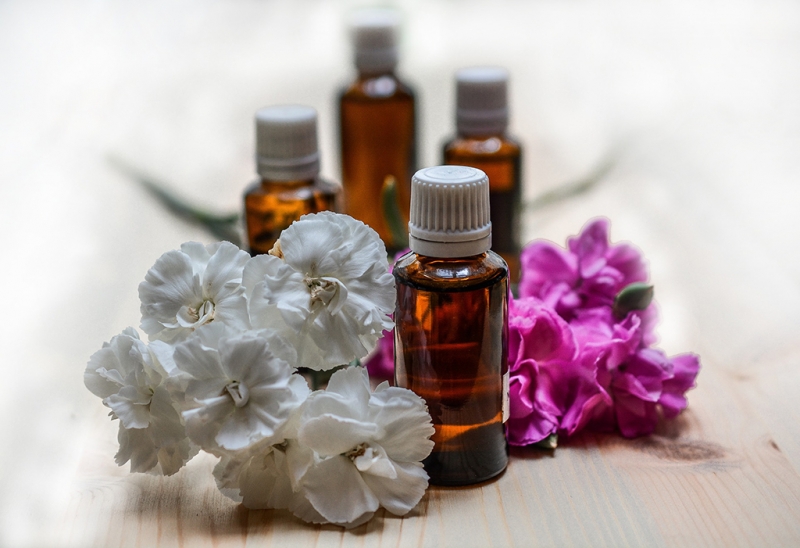Essential oils can be as vital for the medicine cabinet as sticking plaster, paracetamol and disinfectant, genuine essential oils can soothe minor childhood ailments. Do not ingest orally. Here are our favourite essential oils to have at home in your medicine cabinet:
Tea tree oil
Tea tree oil comes from a native Australian plant called Melaleuca alternifolia and is hailed as a cure-all with antiseptic, antibacterial, antifungal and even antiviral properties when applied to the skin. Information about the safety and efficacy of tea tree oil for pregnant or breastfeeding women is sadly lacking, so most qualified naturopaths suggest avoiding the use of tea tree oil during pregnancy and lactation. Oh, and it’s definitely not an oil that you should ever ingest or swallow!
For lice eradication
Add a tablespoon of tea tree oil to hair conditioner and leave on wet hair for 30 minutes before washing out and combing. For other ways to eradicate head lice, read our 30 ways to get rid of head lice.
For acne breakouts
Dab a little tea tree oil directly onto the pimple before bedtime. Wash off in the morning. To find out more about acne, read our Acne article.
For sore throats and congestion
Add 3 drops of tea tree oil to a large bowl of boiling water. With a towel over your head and the bowl, lean over the bowl and inhale deeply for 5-10 minutes. To find out more about sore throats and flu, read our flu know-how article.
Eucalyptus oil
Eucalyptus oil has anti-inflammatory, antibacterial and pain-relieving properties and stimulates the immune system. Particularly effective on respiratory system conditions such as bronchitis, influenza, coughs and colds, eucalyptus oil is used in many of the lozenges, inhalants and ointments you stock up on at the chemist when youre unwell.
Easing muscle soreness
Combine eucalyptus oil with a carrier oil such as sweet almond oil and massage into tender area to ease aches and pains.
Insect bites
Dab a little eucalyptus oil directly to the site of the insect bite for relief from itching.
Sore throat:
Gargle warm salt water with 1-2 drops of eucalyptus oil added. Spit out. Do not swallow! Eucalyptus oil is poisonous when ingested.
Lavender oil
Lavender oil has long been used in perfume making but its medicinal used are less well known. Lavender is a pain reliever and antiseptic, particularly good for minor burns and insect bites and stings. Lavender oil is also known to be effective in tackling skin-related conditions such as sunburn, stretchmarks, psoriasis and wounds.
Tension headaches
Dab a little lavender oil on the temples and massage gently in. It can also be effective if the vapour is breathed in.
Easing sunburn
Make a cool compress (not cold!) from room temperature water and a couple of drops of lavender oil and apply to the burnt skin. Lavender oil helps the skin to heal and prevents scarring. To find out more about pain relief for sunburn, read our guide to pain relief for children.
Soothing a crying baby
Put one drop of lavender oil on your shoulder before settling your baby to sleep on that shoulder. To find out more about settling babies, read our guide to settling newborn babies.
Peppermint oil
Aside from flavouring everything from ice-cream to sweets and toothpaste, peppermint oil has long been used medicinally, especially for digestive system conditions. The health benefits of peppermint oil include its ability to treat indigestion, respiratory problems, headache, nausea, fever, stomach and bowel spasms and pain. Peppermint oil contains menthol, menthone and menthyl esters and is often found in soap, shampoo, cigarette, toothpaste and chewing gum.
Relief from heartburn
Add a drop of peppermint oil to your favourite herbal tea to help digestion generally and heartburn in particular. Find out more about soothing heartburn in pregnancy with our guide to easing pregnancy complaints.
Fever in children
Add a drop of peppermint oil to a carrier oil and apply to the soles of the feet of the feverish child by massaging gently. Add a drop of peppermint oil to warm water and, using a washer, dab the face and arms. To find out more about easing fever for babies and children, read our guide to fever and temperatures.
Belly ache
Rub a little peppermint oil onto the stomach and lower back to relieve wind. To find out more about other home remedies for common childhood maladies, read our guide to home remedies for childhood illnesses.
Clary sage oil
Clary sage oil is known for its calming influence on the nerves, gynaecological and digestive systems. It is also effective against skin conditions such as acne, boils and ulcers. Clary sage has a very pungent smell so be sure to decide whether you can tolerate the smell before you use it. Like many essential oils, it is contraindicated for pregnancy and not recommended.
Clary sage oil is also extremely strong and should never be applied topically without the use of a carrier oil. The therapeutic properties of clary sage oil are antidepressant, anticonvulsive, antispasmodic, antiseptic, aphrodisiac, astringent, bactericidal, carminative, deodorant, digestive, emmenagogue, euphoric, hypotensive, nervine, sedative, stomachic, uterine and nerve tonic.
During labour and delivery
Soak a cottonwool ball with clary sage oil and place nearby. Clary sage is said to help contractions become more regular and intense and can be used to progress labour. To find out more about easing pain during labour, read our guide to labour.
Eye inflammation
Dab a little clary sage oil over the painful area to soothe the area.
Premenstrual symptoms and menstrual cramps
Add a couple of drops of clary sage oil to a warm bath. The bathwater will allow your skin to absorb the oil.
This article was written by Ella Walsh for Kidspot New Zealand, New Zealand’s best family health resource.







Leave A Comment
You must be logged in to post a comment.